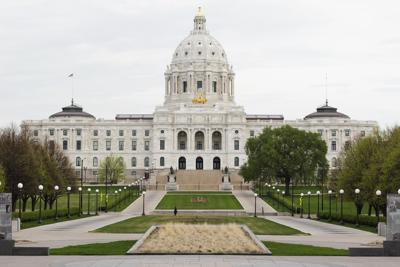Members of the Minnesota Legislature’s minority parties are no strangers to partisanship, but they say lawmakers can find agreement on a host of issues before this year’s legislative session ends in mid-May.
Broadband, federal business loan and unemployment benefit tax relief, and summer school funding are among the Legislature’s shared priorities thus far.
“I think there’s probably a lot that we could agree on,” House Minority Leader Kurt Daudt, R-Crown, said. Daudt and other lawmakers are touring the state while the Legislature is on break this week.
Lawmakers are still pushing partisan messages. Daudt repeated Republican concerns over the governor’s emergency powers and said House Democrats needed to speed up the legislative process to address major bills. Democrats say the GOP-controlled Senate needs to be willing to address more funding priorities. Yet legislators say there’s a lot of common ground to be found between Democrats and Republicans with less than seven weeks remaining in the 2021 session.
Both parties agree on tax relief for federal Payment Protection Program loans, though there’s disagreement over how much should be forgiven. Gov. Tim Walz’s revised budget calls for relief on the first $350,000 in loans, which state officials estimate would address 90% of the loans given to Minnesota businesses. The Senate passed a proposal earlier this month eliminating taxes on all PPP loans. Daudt said he supports tax relief for all PPP loans.
Lawmakers on both sides of the aisle also agree with tax relief for Minnesotans who received federal supplemental unemployment aid over the past year. There’s also support for supplemental education funding for summer school programs this year in an effort to address classroom issues caused by the ongoing COVID-19 pandemic.
Yet lawmakers could find the most support for broadband funding and other one-time appropriations this year as Minnesota faces a projected $1.6 billion surplus, with another $2.6 billion in federal COVID-related aid on the way.
“I think this will be the session where the greatest of support is put into rural broadband in the state’s history,” Sen. Nick Frentz, DFL-North Mankato, told more than 100 people in a Senate DFL virtual town hall on Greater Minnesota issues Tuesday night.
Frentz said after the town hall he expects even more support than normal from lawmakers who have all faced pleas for help with internet issues in the wake of the pandemic. Lawmakers on both sides of the aisle pitched spending up to $120 million over the next two years in proposals earlier this year, and a Senate GOP budget includes $40 million for one year of broadband funding.
Frentz said he wouldn’t be surprised to see that target grow during budget negotiations. The bigger question, according to him, is whether that funding goes to wired fiber optic broadband projects or wireless projects.
DFL and GOP lawmakers have split in the past over which kind of broadband to support. Democrats tend to favor wired broadband projects as they’re the most reliable internet options, but they’re also the most expensive broadband networks to install. Republicans tend to favor wireless internet options as they’re cheaper, but critics say wireless broadband networks fail too often.
Lawmakers have heard more testimony this year from wireless broadband providers who say the technology is catching up and offering internet that’s just as reliable as wired connections, which Frentz said has softened stances on spending priorities.
The North Mankato Democrat, who also serves as an assistant minority leader, said he expects agricultural proposals such as more funding for young farmers starting their careers to receive bipartisan support. Frentz said he thinks lawmakers could support investing more in housing as the state weighs ending an eviction moratorium over the next few months.
It remains to be seen what lawmakers will finalize. DFL and GOP politicians are about $600 million apart on a two-year state budget they must approve by the end of June, while a variety of issues remain up for negotiation, from increasing taxes on higher income earners and businesses to hundreds of millions of dollars in tax cuts.


























Commented
Sorry, there are no recent results for popular commented articles.